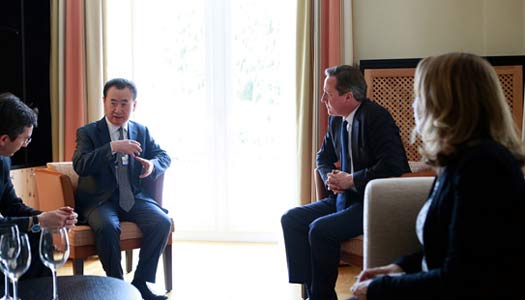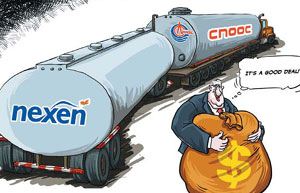
Nuke companies pursue future power abroad
Updated: 2012-11-03 11:48Potential challenges
Like in every other overseas deal involving large State-backed Chinese corporations, the Western fear of national security and technology theft is often cited as a major obstacle for Chinese companies planning investments in overseas nuclear projects.
In the case of the UK Horizon deal, British officials were believed to have pressed for limiting the stake of Chinese investors in the deal due to the sensitivity of the nuclear sector.
British energy experts also fear that Chinese involvement in the project will allow China access to the UK electricity grid and nuclear technology, which it feels might threaten its energy security.
Although the exact reason for Chinese companies staying away from the Horizon project still remains unclear, some analysts say that UK's energy security concerns might have blocked China's involvement.
"We want to maintain a low profile and do not want any unnecessary exposure in the international market as nuclear development remains a sensitive topic especially after the Fukushima crisis," a Chinese employee at the French office of CGNPC says.
Another major hurdle for Chinese nuclear enterprises vying for bids in foreign nuclear markets is the international acceptance of Chinese technology, industry experts say.
The global nuclear technology market is dominated by Western companies like US-based Westinghouse, Areva and EDF from France and Russian firm Rosatom. These companies, apart from being big brands by themselves, are also reputed for their excellent safety standards.
The options of nuclear reactors that Chinese companies are able to build overseas are limited and restricted mostly to the older domestic model based on second-generation technology. The fact that Areva and Westinghouse own the intellectual property rights for the reactor designs also prevent Chinese companies from exporting the most advanced reactors being built in China.
Experts feel that China needs to catch up with Western companies in terms of design and develop homemade advanced reactor technologies to build a credible brand for exports and such a process could take decades to achieve.
China in recent years has felt the urgency to develop its self-designed reactor technology and reduce dependence on foreign technology.
CGNPC in November 2011 announced its own third-generation reactor using ACPR-1000 technology, which is an improved technology based on the lessons drawn from the Fukushima crisis and is believed to be safer than the existing CPR-1000.
The ACPR-1000 replaced the intellectual property rights limited components and the company aims to independently market the technology for export by 2013.
Its rival CNNC is also making progress in developing small reactor technology ACP-100 that has more promising prospects in the international market after the Fukushima crisis.
ACP-100 technology can be applied to small-sized reactors with a capacity below 300 megawatts per unit. The small-sized technology model has higher safety standards, shorter construction time and is easier to finance, experts say.
The technology will be the first China-engineered improved third-generation reactor technology and it will be installed in the Putian power plant in Fujian province by next year.
CNNC and CGNPC are reportedly seeking to sell their self-developed reactor technology to nuclear power plants in other emerging countries such as Belarus and South Africa.
In a recently issued nuclear safety plan, the Chinese government has also pledged to invest $12.8 billion to upgrade its nuclear facilities to meet higher international safety standards.
Although China is still in the early years of nuclear development, it will soon be considered "an adult" competing with Western nuclear companies in the international markets, says CEA chairman Bigot.
"Developing a brand is not an overnight process and buyers wish to have safe products," he says. "But certainly someday it will happen as China learns and masters the technology very fast."
Some experts predict that China will soon catch up with the world's top nuclear exporting powers within 10 years and the former partner will turn into a formidable competitor as China gains operational experience with its new technologies.
"The UK has hoped to replicate the development pattern of France that has ensured 30 years of safe operation," Gadonneix says. "But I am confident that other patterns might well appear in the future once China has gained experience on all fronts from design to building to operating and maintaining.
"China has strong assets already and improves them everyday. With more than 25 nuclear reactors under construction, China will have plenty of experiences to share," he says.
Future prospects
The Fukushima crisis was a heavy blow for global nuclear energy prospects and reignited debate among government officials and industry experts about whether nuclear power was a viable solution for countries to meet growing energy demands.
Oliver Morton, a British science editor, wrote in an article published by the Economist magazine earlier this year that nuclear power will not go away but its role may never be more than marginal.
But some experts disagreed, arguing that nuclear power will remain an important part of the global energy mix and the future development of nuclear power plants will be dominated by emerging economies such as China and India.
According to a report by the World Energy Council, there are at least 50 countries in the world that are operating, building or considering nuclear generation as a viable solution for energy demand.
Half of them are emerging economies or nuclear "newcomers" aiming to develop nuclear power production to better cope with the challenges of an affordable and low-carbon energy production, the report said.
While some predict that cost concerns may see renewable energy pip nuclear power, CEA chairman Bigot argues that renewable power suffers from its interruptible characteristics and some fundamental physical limits.
"As long as we have not found out the way to store energy at sufficient scale, I do believe that the renewable energy, whatever the price would be, will not be able to sufficiently cope with the energy need of the countries," he says.
"Nuclear power and renewable energy are complementary. My expectation is that nuclear energy has a bright future as long as we cope correctly with safety."
Wei Tian contributed to the story.
lixiang@chinadaily.com.cn
- BYD exports three electric cars to Thailand
- Grid gets first jolt of residential solar power
- US now largest buyer of China's exports
- China's outbound M&As on the rise
- Tobacco control may entail price, tax rises
- Quanzhou becomes pilot financial reform zone
- New automobiles shine at Geneva Motor Show
- World's longest high-speed rail 'on track'
- Jiugui Liquor involved in plasticizer scandal again
- Accident reignites school bus safety concerns
- China to revise labor law
- Trademark registration under scrutiny
- Dinner ban takes toll on liquor firms
- CIC tables bid for London's Chiswick Park
- Property buyers eye overseas market
- Call for law to protect personal information
- China to cut train ticket prices
- Christmas business
- Solar industry to get jolt from new policies
- KFC chicken under spotlight














